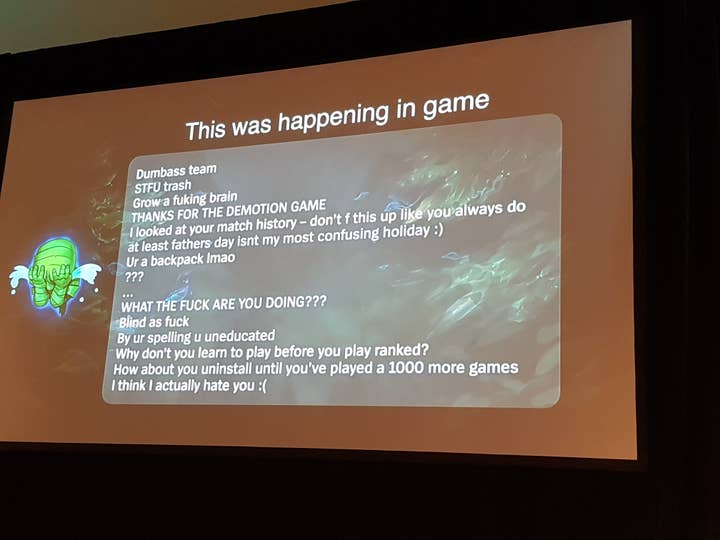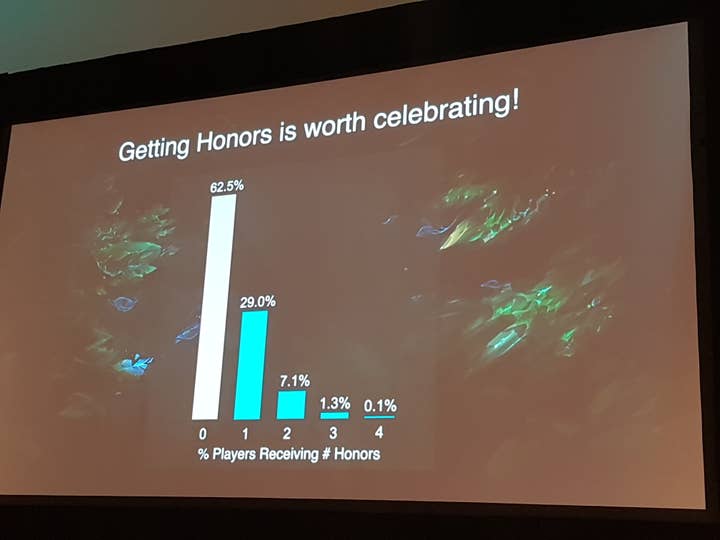Riot's recipe for "sportsmanship" in League of Legends
At GDC, Kimberly Voll detailed how Riot Games successfully revamped LoL's ineffective Honor system
In 2016, Riot Games took a long, hard look at the billion-dollar League of Legends empire and found it wanting. Despite the money the game made, despite the tens of millions who played it each month, Riot decided it was letting its community down. In terms of encouraging "sportsmanship" and positive play, it slapped its own efforts with an F.
"Encouragement" was one of three key areas for creating a healthy community and minimising "disruptive" behaviour identified by Riot's Kimberly Voll at GDC yesterday. "I care about why people do what they do in games, around games," she told the packed room at the start of her detailed, energetic talk. "I deeply care about video games, their role in society, and beyond."
Voll, a senior technical designer at Riot, was a key figure in revamping League of Legends' "Honor" system, which had been in place for several years but, in 2016, was having little of the constructive impact that was its intended purpose. After four years, 40 per cent of players didn't find Honor meaningful, despite 98 per cent being aware of its existence and function. League of Legends had mechanics to inspire a friendly community, but an internal review revealed that the system was "effectively doing nothing" to prevent the attitude evident in this slide - all language quoted directly from game sessions, between people on the same team.

It was in response to these findings that Riot defined the three qualities necessary for a good community, and gave an honest appraisal of its own performance: it got the F for Encouragement, a B- for Consequences, and a D- for League of Legends' Environment.
"This is all of the things together that contribute to how we think," Voll said. "Our moods, our habits. It's everything from the game itself, to the metagame, to genre norms, to society norms.
"It turned out that Honoring wasn't actually a core part of the game. To Honor somebody you had to remember at the end of the [match] to go to the spot and click the thing... There were lots of reasons why Honor never bubbled up to being important to our players.
"We ended up in a spot where, despite everybody's best efforts, Honor didn't matter"
"We ended up in a spot where, despite everybody's best efforts, Honor didn't matter."
A small portion of the League of Legends community did appreciate the Honor system, and Riot used their feedback as "the kernel" for a more nuanced overhaul of every aspect; one designed to "celebrate in the way [players] wanted to celebrate", and do so without needing to be "shoved in anybody's face."
At the core of it all was the notion of "sportsmanship", which Voll emphasised was different from skill - but no less valuable. Skill, she said, has traditionally been regarded as the "the only vector that defines success" in gaming culture, but, "sportsmanship is [also] a part of that. It's one of the areas that we most need to catch up as an industry... We wanted to make sure that every player felt that they could be celebrated."
Riot introduced three new systems. The first was a voting screen at the end of each match, which every player sees even if they elect to click straight past it. On this screen, players could nominate a single team member for one of three newly created awards, each extolling a distinct virtue that isn't intrinsically tied to the conventional perception of skill: "Stayed Cool", "Shot Caller", and the more lighthearted "GG <3".
"They were challenging," Voll said. "It actually took is two months to come up with these three categories... We wanted them to provide some degree of guidance as to what 'good' looks like."
"Don't assume teamwork happens naturally... Help players to celebrate one another"
The second system was around progression, and specifically the rejection of the "progress bar" that features in so many levelling systems. A visible bar encouraged grinding, Voll said, and implicitly suggested that players with more time to invest in the game had greater value. A new "checkpoint" system illustrated and rewarded progress in a more subtle manner, and also stripped away progress between levels as a consequence for negative behavior.
Another key area of the overhaul was publishing, Voll said, which is easy to overlook. One of the main reasons the new Honor system worked was due to the efforts of Riot's marketing team, which created witty videos to sell the concepts at its core. Voll showed the crowd two videos: one was a smartly and expensively made piece featuring real actors; the other a snappily edited montage of gameplay footage, which Voll acknowledged would be more feasible for developers with fewer resources.
Thanks to these and other changes, League of Legends' community has changed for the better, Voll said. In 2016, players would give another player an Honor once a month on average; today, they are given out 60 per cent of the time, and Voll highlighted the importance of the 40 per cent in which they are not awarded. The scarcity of these accolades is a key reason why the system works. "Most of the time you don't get an Honor," she said, "and it's incredibly rare to get four Honors."

Voll admitted that there was concern that its attempt to promote "sportsmanship" would be co-opted by players who cared only about skill. However, this proved to not be the case. "Turns out that skils is a really poor predictor of Honors," she said. "If you're not being really great and really sportsmanlike to your team, you're probably not going to see any Honors... That was really relieving. It showed we had given players a tool that helped them in their quest to bring more sportsmanship into the game.
"Today, player sentiment is much higher toward our efforts to promote sportsmanship. It's exciting. We're going in the right direction. Disruptive behaviour has measurably dropped.
"But there's still a lot of work to do. The thing with player behaviour, and the thing with systems like Honor, is that we need to continue to invest. Communities change over time; we learn new things, we screw up in new ways, and we need to adapt and keep evolving these systems... We're going to continue to invest. It will never be done."
"We're doing this with a game that's ten years old... Imagine what you could do if you start out with this thinking from the very beginning"
Voll closed her talk with some advice for those at GDC who wanted to create positive, sporting communities for their games. Empathy is vital in understanding and addressing disruptive behaviour, she said, and in identifying what you can and can't change as a designer.
"We're all human," she said. "Resist the urge to say, 'It's just the jerks over there, and us over here.' You know what? We're all jerks sometimes - all of us, together - but ultimately we're all people, and the more that we hold ourselves accountable as designers to understand this, the better able we'll be to adapt and respond with our designs.
"Don't assume teamwork happens naturally... Help players to celebrate one another. Create opportunities for them to call out one another [in positive ways]."
Managing player expectations is also crucial, she said, particularly the need, "not to overstate things as solutions. We're all figuring it out in this collective, crazy, scary online world. We're not solving things; we're growing together... Show players that you're jumping in, and that this is crossing the priority bar; that this matters, and that you're investing resources towards systems that will change and improve the experience."
Voll restated this need for investment several times. Games don't just require features to encourage positive behaviour; they require "first-class features" that are crafted with the same care as any other aspect of the product. Every developer should decide on the values at the heart of the experience they are creating early on, and make sure these are reinforced by every aspect of the design.
"These are not secondary things," she said. "This is not, 'Oh, let's add on a punishment system at the end.' No. No. First-class features. Features that you fund from the very beginning, that you sit down with your team and think about deeply... You need to design these things into the very DNA."
"And that's something that we didn't get to do with League of Legends. The game was already out there in people's hands before we realised we probably needed to invest in this... We are constantly challenging our assumptions. We're trying all the time, and we're finding new assumptions that we've made all the time. And we're doing this with a game that's ten years old almost.
"So imagine what you could do today. Imagine what you could do if you start out with this thinking from the very beginning."
